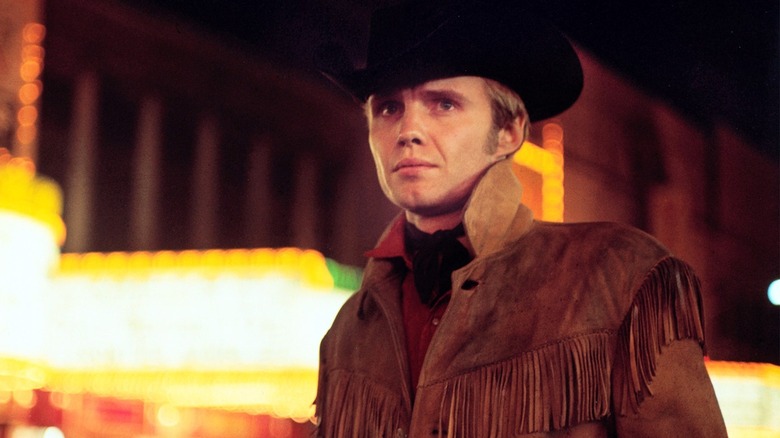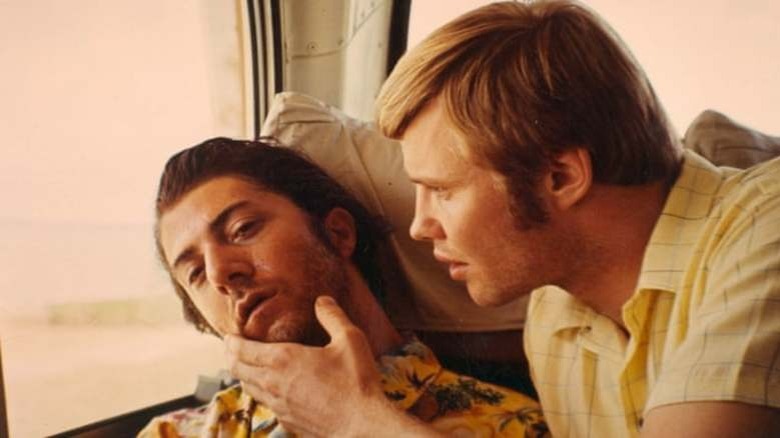Midnight Cowboy Ending Explained: A Bittersweet Dream Of A Brighter Future
At the heart of "Midnight Cowboy" are two loners who find one another amidst the chaos of urban life. John Schlesinger's bold deconstruction of masculinity and the American dream focuses on Joe Buck (Jon Voight), a male prostitute from Texas who travels to New York City seeking fame and fortune. He eventually meets and develops a strong attachment to Ratso Rizzo (Dustin Hoffman), a pickpocket with a limp.
The crafty and obnoxious con man becomes Joe's pimp, sprucing him up and giving him the connections to seduce affluent New York women. Ratso allows Joe to room with him in the grimy, condemned tenement building where he lives. Despite their squalid surroundings, they settle into a comfortable domestic partnership where they take care of one another by sharing meals, finding clothes, and hustling the streets. But soon Ratso's shaky well-being quickly deteriorates, and he comes down with possibly tuberculosis or pneumonia — likely exacerbated by his filthy living conditions.
When Joe returns home after a successful tryst with one of his clients, he finds a feverish Ratso lying on the bed. Ratso refuses medical treatment (not that he could afford it anyway) and begs Joe to put him on a bus to Florida, his dream destination. In a quirky fantasy sequence, Ratso imagines frolicking with a shirtless Joe on the beach. The bright Miami sun and sparkling ocean waves juxtapose the dark grittiness of the city. He pictures Florida as a bright, colorful bevy of women, money, and delicious food. In his reverie, Ratso is called the more upstanding name of Rico and no longer has a limp. Director John Schlesinger intercuts close-ups of Ratso with an expression of tenderness looking on at Joe while wishing for this utopian life.
After discovering his sick friend, Joe must brutally beat (and possibly kill?) a man for the money to purchase their bus tickets to Miami. As they head south, a sweaty, pallid-faced Ratso lies back on the bus chair. He starts crying when he realizes that he wet himself, but Joe sweetly uses humor to uplift his spirits: "You took a little rest stop that wasn't on the schedule, is all," he says before they erupt into giggles. But the bus ride soon turns tragic.
Joe's only friend passes away
After a pit stop, Joe returns with new clothes, leaving his cowboy persona behind and putting Ratso in a tropical shirt to reflect their sunny new environment. Joe is emboldened by the change of scenery and tells Ratso that he plans to give up hustling for a regular job. When he turns to his friend, he realizes that he has died with his eyes open, looking towards a promising future that he will never experience. The bus driver tells Joe they cannot stop and must continue to Miami, so he closes Ratso's eyelids and protectively puts his arm. As he cradles Ratso with a strong yet tender grip, he realizes that he must find his way in this new place without him.
What is so tragic about this ending is that Joe's relationship with Ratso was the only time he ever experienced unconditional love. Whether or not their deep connection has any queer subtext is up for debate, but both characters do negotiate their sexuality throughout the film. "Ratso seems to live in a near-constant state of gay panic; he uses the epithet "f****t" frequently but almost always as a pathetic assertion of his place in the pecking order," Mark Harris observes in Criterion.
Joe has a difficult relationship with his sexuality: he was abandoned by his mother, had a semi-incestuous relationship with his grandmother, and he and his girlfriend were gang-raped by a group of men in Texas. Joe responds to any questions or accusations of homosexuality with violence and aggression. In one scene, when a wealthy client asks him if he is gay after he has trouble performing sexually, "he overcompensates with savage lovemaking in order to prove that he is not." (via Fandor).
The most important aspect of Ratso and Joe's relationship — romantic or not — is that they bring out the best in one another, evidenced in Hoffman and Voight's stirring performances. Both characters look out for one another while carrying the weight of their own intense childhood traumas. Joe's "unconventional relationship with Ratso is the closest thing to love that Joe has had in his life — it is no irony that this partnership is never sexual," The Guardian shrewdly points out. Unlike everyone else he has ever known — even his own family — Ratso supports Joe without expecting sexual gratification in return.
The loss of Ratso on the way to Florida is devastating and leaves the audience with a vague hope that Joe will find some peace. As Joe looks out the window, the reflection of his new town passing across his face, the ambiguous ending lets the audience wonder if Joe will ever overcome his haunting memories. What is clear is that Ratso will leave an everlasting mark on his life.

